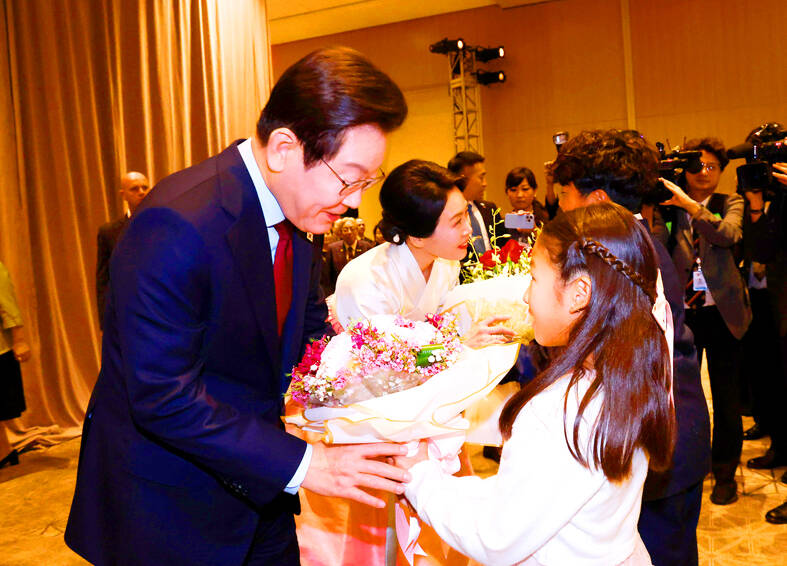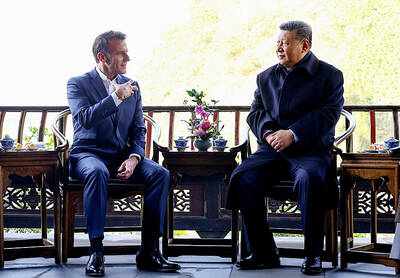South Korean President Lee Jae-myung faced a pivotal moment yesterday, when he was slated to meet US President Donald Trump in Washington for their first summit, as the countries’ decades-old alliance strains to confront rapid geopolitical changes.
Much is riding on the meeting for Lee, who took office in June after a snap election called after his conservative predecessor — feted in Washington for his hard line on North Korea — was removed for attempting to impose martial law.
South Korea’s economy relies heavily on the US, with Washington underwriting its security with troops and nuclear deterrence. Lee hopes to chart a balanced path of cooperation with the US, while not antagonizing top trade partner China.

Photo: EPA
As he headed to the US, Lee sent a special delegation to Beijing, which delivered a message calling for normalized relations with China that have been strained in recent years.
South Korea has long come under targeted criticism from Trump, who has called it a “money machine” that takes advantage of US military protection.
Lee would seek to make a good impression, connect personally with Trump and, above all, avoid any unpleasant surprises, analysts said.
“For Lee, a no-news summit I think would be good,” said Victor Cha of the Center for Strategic and International Studies.
Under heavy pressure from Trump’s administration, South Korean negotiators last month secured a last-minute deal to avoid the harshest of new US tariffs, but they must still hammer out details of billions of dollars in promised investments in the US.
South Korean officials say they hope such working-level trade negotiations would largely be left for other meetings.
“There are many major topics in the security field,” Lee’s top policy aide, Kim Yong-beom, said last week.
“Our position is that trade was already finalized last time. We hope that specific implementation plans for trade won’t be included in the summit at all, or at least should be kept simple if discussed,” he added.
Several top officials, including the foreign minister, rushed to Washington over the weekend to try to iron out final details.
Lee, who arrived in Washington on Sunday, would highlight some of South Korea’s expected investments when he visits a shipyard in Philadelphia owned by the country’s Hanwha Group after the summit. Cooperation to help the ailing US shipbuilding sector is part of the broad tariff agreement reached between the countries.
Trump was expected to pressure Lee to commit to more spending on defense, including potentially billions of dollars more toward the upkeep of 28,500 US troops stationed in South Korea.
Wi Sung-lac, Lee’s top security adviser, said South Korea was in talks with Washington over defense spending, taking as a reference NATO’s agreement on a big new defense spending target.
Wi added that the government was also looking into a plan for the purchase of US weapons.
While focusing on increasing military spending, Lee would likely seek to avoid conversations about a potential reduction of US troops or using them for a wider range of operations, or details on modernizing the alliance, said Kim Du-yeon, a Seoul-based adjunct senior fellow with the Indo-Pacific Security Program at the Center for a New American Security.
Lee told reporters it would be difficult for Seoul to accept the demand by the US to adopt “flexibility” in operating the US military stationed in South Korea.
“They should leave those topics for working-level officials to hash out,” Kim said. “Ambition could backfire.”
Trump and Lee might also discuss efforts to persuade North Korea to freeze and eventually abandon its nuclear weapons program.
Both leaders support engaging Pyongyang, and Lee has called for a phased approach to denuclearization.
North Korean leader Kim Jong-un says South Korea and the US remain hostile to his country and he will never give up his nuclear arsenal.
Over the weekend Kim supervised test firing of new air defense systems.

PARLIAMENT CHAOS: Police forcibly removed Brazilian Deputy Glauber Braga after he called the legislation part of a ‘coup offensive’ and occupied the speaker’s chair Brazil’s lower house of Congress early yesterday approved a bill that could slash former Brazilian president Jair Bolsonaro’s prison sentence for plotting a coup, after efforts by a lawmaker to disrupt the proceedings sparked chaos in parliament. Bolsonaro has been serving a 27-year term since last month after his conviction for a scheme to stop Brazilian President Luiz Inacio Lula da Silva from taking office after the 2022 election. Lawmakers had been discussing a bill that would significantly reduce sentences for several crimes, including attempting a coup d’etat — opening up the prospect that Bolsonaro, 70, could have his sentence cut to

A plan by Switzerland’s right-wing People’s Party to cap the population at 10 million has the backing of almost half the country, according to a poll before an expected vote next year. The party, which has long campaigned against immigration, argues that too-fast population growth is overwhelming housing, transport and public services. The level of support comes despite the government urging voters to reject it, warning that strict curbs would damage the economy and prosperity, as Swiss companies depend on foreign workers. The poll by newspaper group Tamedia/20 Minuten and released yesterday showed that 48 percent of the population plan to vote

A powerful magnitude 7.6 earthquake shook Japan’s northeast region late on Monday, prompting tsunami warnings and orders for residents to evacuate. A tsunami as high as three metres (10 feet) could hit Japan’s northeastern coast after an earthquake with an estimated magnitude of 7.6 occurred offshore at 11:15 p.m. (1415 GMT), the Japan Meteorological Agency (JMA) said. Tsunami warnings were issued for the prefectures of Hokkaido, Aomori and Iwate, and a tsunami of 40cm had been observed at Aomori’s Mutsu Ogawara and Hokkaido’s Urakawa ports before midnight, JMA said. The epicentre of the quake was 80 km (50 miles) off the coast of

RELAXED: After talks on Ukraine and trade, the French president met with students while his wife visited pandas, after the pair parted ways with their Chinese counterparts French President Emmanuel Macron concluded his fourth state visit to China yesterday in Chengdu, striking a more relaxed note after tough discussions on Ukraine and trade with Chinese President Xi Jinping (習近平) a day earlier. Far from the imposing Great Hall of the People in Beijing where the two leaders held talks, Xi and China’s first lady, Peng Liyuan (彭麗媛), showed Macron and his wife Brigitte around the centuries-old Dujiangyan Dam, a World Heritage Site set against the mountainous landscape of Sichuan Province. Macron was told through an interpreter about the ancient irrigation system, which dates back to the third century